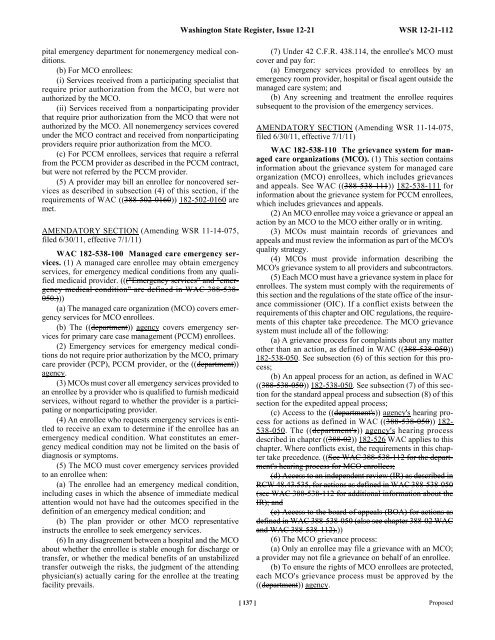Proposed
Proposed
Proposed
Create successful ePaper yourself
Turn your PDF publications into a flip-book with our unique Google optimized e-Paper software.
pital emergency department for nonemergency medical conditions.<br />
(b) For MCO enrollees:<br />
(i) Services received from a participating specialist that<br />
require prior authorization from the MCO, but were not<br />
authorized by the MCO.<br />
(ii) Services received from a nonparticipating provider<br />
that require prior authorization from the MCO that were not<br />
authorized by the MCO. All nonemergency services covered<br />
under the MCO contract and received from nonparticipating<br />
providers require prior authorization from the MCO.<br />
(c) For PCCM enrollees, services that require a referral<br />
from the PCCM provider as described in the PCCM contract,<br />
but were not referred by the PCCM provider.<br />
(5) A provider may bill an enrollee for noncovered services<br />
as described in subsection (4) of this section, if the<br />
requirements of WAC ((388-502-0160)) 182-502-0160 are<br />
met.<br />
AMENDATORY SECTION (Amending WSR 11-14-075,<br />
filed 6/30/11, effective 7/1/11)<br />
WAC 182-538-100 Managed care emergency services.<br />
(1) A managed care enrollee may obtain emergency<br />
services, for emergency medical conditions from any qualified<br />
medicaid provider. ((("Emergency services" and "emergency<br />
medical condition" are defined in WAC 388-538-<br />
050.)))<br />
(a) The managed care organization (MCO) covers emergency<br />
services for MCO enrollees.<br />
(b) The ((department)) agency covers emergency services<br />
for primary care case management (PCCM) enrollees.<br />
(2) Emergency services for emergency medical conditions<br />
do not require prior authorization by the MCO, primary<br />
care provider (PCP), PCCM provider, or the ((department))<br />
agency.<br />
(3) MCOs must cover all emergency services provided to<br />
an enrollee by a provider who is qualified to furnish medicaid<br />
services, without regard to whether the provider is a participating<br />
or nonparticipating provider.<br />
(4) An enrollee who requests emergency services is entitled<br />
to receive an exam to determine if the enrollee has an<br />
emergency medical condition. What constitutes an emergency<br />
medical condition may not be limited on the basis of<br />
diagnosis or symptoms.<br />
(5) The MCO must cover emergency services provided<br />
to an enrollee when:<br />
(a) The enrollee had an emergency medical condition,<br />
including cases in which the absence of immediate medical<br />
attention would not have had the outcomes specified in the<br />
definition of an emergency medical condition; and<br />
(b) The plan provider or other MCO representative<br />
instructs the enrollee to seek emergency services.<br />
(6) In any disagreement between a hospital and the MCO<br />
about whether the enrollee is stable enough for discharge or<br />
transfer, or whether the medical benefits of an unstabilized<br />
transfer outweigh the risks, the judgment of the attending<br />
physician(s) actually caring for the enrollee at the treating<br />
facility prevails.<br />
Washington State Register, Issue 12-21 WSR 12-21-112<br />
(7) Under 42 C.F.R. 438.114, the enrollee's MCO must<br />
cover and pay for:<br />
(a) Emergency services provided to enrollees by an<br />
emergency room provider, hospital or fiscal agent outside the<br />
managed care system; and<br />
(b) Any screening and treatment the enrollee requires<br />
subsequent to the provision of the emergency services.<br />
AMENDATORY SECTION (Amending WSR 11-14-075,<br />
filed 6/30/11, effective 7/1/11)<br />
WAC 182-538-110 The grievance system for managed<br />
care organizations (MCO). (1) This section contains<br />
information about the grievance system for managed care<br />
organization (MCO) enrollees, which includes grievances<br />
and appeals. See WAC ((388-538-111)) 182-538-111 for<br />
information about the grievance system for PCCM enrollees,<br />
which includes grievances and appeals.<br />
(2) An MCO enrollee may voice a grievance or appeal an<br />
action by an MCO to the MCO either orally or in writing.<br />
(3) MCOs must maintain records of grievances and<br />
appeals and must review the information as part of the MCO's<br />
quality strategy.<br />
(4) MCOs must provide information describing the<br />
MCO's grievance system to all providers and subcontractors.<br />
(5) Each MCO must have a grievance system in place for<br />
enrollees. The system must comply with the requirements of<br />
this section and the regulations of the state office of the insurance<br />
commissioner (OIC). If a conflict exists between the<br />
requirements of this chapter and OIC regulations, the requirements<br />
of this chapter take precedence. The MCO grievance<br />
system must include all of the following:<br />
(a) A grievance process for complaints about any matter<br />
other than an action, as defined in WAC ((388-538-050))<br />
182-538-050. See subsection (6) of this section for this process;<br />
(b) An appeal process for an action, as defined in WAC<br />
((388-538-050)) 182-538-050. See subsection (7) of this section<br />
for the standard appeal process and subsection (8) of this<br />
section for the expedited appeal process;<br />
(c) Access to the ((department's)) agency's hearing process<br />
for actions as defined in WAC ((388-538-050)) 182-<br />
538-050. The ((department's)) agency's hearing process<br />
described in chapter ((388-02)) 182-526 WAC applies to this<br />
chapter. Where conflicts exist, the requirements in this chapter<br />
take precedence. ((See WAC 388-538-112 for the department's<br />
hearing process for MCO enrollees;<br />
(d) Access to an independent review (IR) as described in<br />
RCW 48.43.535, for actions as defined in WAC 388-538-050<br />
(see WAC 388-538-112 for additional information about the<br />
IR); and<br />
(e) Access to the board of appeals (BOA) for actions as<br />
defined in WAC 388-538-050 (also see chapter 388-02 WAC<br />
and WAC 388-538-112).))<br />
(6) The MCO grievance process:<br />
(a) Only an enrollee may file a grievance with an MCO;<br />
a provider may not file a grievance on behalf of an enrollee.<br />
(b) To ensure the rights of MCO enrollees are protected,<br />
each MCO's grievance process must be approved by the<br />
((department)) agency.<br />
[ 137 ] <strong>Proposed</strong>
















